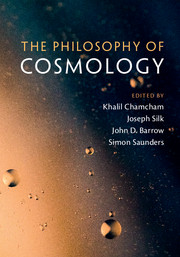Book contents
- Frontmatter
- Contents
- List of Contributors
- Preface
- Acknowledgments
- Part I Issues in the Philosophy of Cosmology
- 1 The Domain of Cosmology and the Testing of Cosmological Theories
- 2 Black Holes, Cosmology and the Passage of Time: Three Problems at the Limits of Science
- 3 Moving Boundaries? – Comments on the Relationship Between Philosophy and Cosmology
- 4 On the Question Why There Exists Something Rather Than Nothing
- Part II Structures in the Universe and the Structure of Modern Cosmology
- Part III Foundations of Cosmology: Gravity and the Quantum
- Part IV Quantum Foundations and Quantum Gravity
- Part V Methodological and Philosophical Issues
- Index
- References
2 - Black Holes, Cosmology and the Passage of Time: Three Problems at the Limits of Science
from Part I - Issues in the Philosophy of Cosmology
Published online by Cambridge University Press: 18 April 2017
- Frontmatter
- Contents
- List of Contributors
- Preface
- Acknowledgments
- Part I Issues in the Philosophy of Cosmology
- 1 The Domain of Cosmology and the Testing of Cosmological Theories
- 2 Black Holes, Cosmology and the Passage of Time: Three Problems at the Limits of Science
- 3 Moving Boundaries? – Comments on the Relationship Between Philosophy and Cosmology
- 4 On the Question Why There Exists Something Rather Than Nothing
- Part II Structures in the Universe and the Structure of Modern Cosmology
- Part III Foundations of Cosmology: Gravity and the Quantum
- Part IV Quantum Foundations and Quantum Gravity
- Part V Methodological and Philosophical Issues
- Index
- References
Summary
Introduction
The boundary between science and philosophy is often blurred at the frontiers of knowledge. This is because one is dealing with proposals which are not amenable to the usual type of scientific tests, at least initially. Some scientists have an antipathy to philosophy and therefore regard such proposals disparagingly. However, that may be short-sighted because historically science had its origin in natural philosophy and the science/philosophy boundary has continuously shifted as fresh data accumulate. The criteria for science itself have also changed. So ideas on the science/philosophy boundary may eventually become proper science. Sometimes the progress of science may even be powered from this boundary, with new paradigms emerging from there.
A particularly interesting example of this in the context of the physical sciences is cosmology. This is because the history of physics involves the extension of knowledge outwards to progressively larger scales and inwards to progressively smaller ones, and the scientific status of ideas at the smallest and largest scales has always been controversial. Cosmology involves both extremes and so is doubly vulnerable to anti-philosophical criticisms. While cosmography concerns the structure of the Universe on the largest scales, these being dominated by gravity, cosmogeny studies the origin of the Universe and involves arbitrarily small scales, where the other forces of nature prevail. Indeed, there is a sense in which the largest and smallest scales merge at the Big Bang. So cosmology has often had to struggle to maintain its scientific respectability and more conservative physicists still regard some cosmological speculations as going beyond proper science. One example concerns the current debate over the multiverse. The issue is not just whether other Universes exist but whether such speculations can be classified as science even if they do, since they may never be seen.
While most of this chapter focuses on cosmology, two other problems straddling the boundary between physics and philosophy are also discussed. The first concerns black holes. Although these objects were predicted by general relativity a century ago, Albert Einstein thought they were just mathematical artefacts and it was 50 years before observational evidence emerged for their physical reality.
- Type
- Chapter
- Information
- The Philosophy of Cosmology , pp. 40 - 65Publisher: Cambridge University PressPrint publication year: 2017
References
- 1
- Cited by

